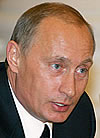Politkovskaya: slim hope for justice
 Oleg Panfilov assesses the twists and turns of the investigation into Anna Politkovskaya’s murder and considers the chances of a fair trial
Oleg Panfilov assesses the twists and turns of the investigation into Anna Politkovskaya’s murder and considers the chances of a fair trial
(more…)
 Oleg Panfilov assesses the twists and turns of the investigation into Anna Politkovskaya’s murder and considers the chances of a fair trial
Oleg Panfilov assesses the twists and turns of the investigation into Anna Politkovskaya’s murder and considers the chances of a fair trial
(more…)
On 4 March, to mark the publication of its latest issue, ‘How Free is the Russian Media?’, Index on Censorship hosted a discussion in London and Moscow on the future of the Russian media under President Medvedev. The discussion featured John Kampfner, Arkady Babchenko (author of One Soldier’s War in Chechnya), Maria Eismont (New Eurasia Foundation, Moscow), Alexander Verkhovsky (Sova Centre, Moscow), Natalia Rostova (Novaya Gazeta), Oleg Panfilov (Centre for Journalism in Extreme Situations), Maria Yulikova (Carnegie Centre) and Sergei Bachinin (Vyatsky Nablyudatel’) and Anna Sevortian (Centre for Development of Democracy).
The event was supported by the Open Society Foundation and the Royal Ministry of Foreign Affairs, Norway.

Coverage of the recent Duma poll and forthcoming presidential race suggests that Russian media increasingly only functions to endorse the government line, writes Oleg Panfilov
On 12 December, Vladimir Putin had an official meeting with the Chairman of the Central Election Commission, Vladimir Churov, and with the chairmen of several regional election commissions. The president offered his congratulations with regard to the Constitution Day and thanked them for the ‘highly professional work’ done during the campaign season of the State Duma elections.
The Central Election Commission is an officially independent organisation, so this meeting, and many others like it, could be viewed with some surprise. However, the reality is that Russians are not surprised or worried about this in the slightest. Political aggression from President Putin’s supporters has long been the norm, and it does not seem to upset anyone. On the contrary, such behaviour is widely welcomed, as many regard Putin’s actions to be an expression of masculine power, supreme courage and strong arm tactics.

Vladimir Putin is ultimately responsible for last weekend’s oppression of political demonstrations, writes Oksana Chelysheva
There are two Russias nowadays. One is of Putin, with his images on every other bill board, trying hard to crush, scare and harass the other, democratic Russia.
Late Sunday evening I spoke by phone with Ella Poliakova, the chair of Soldiers’ Mothers’ Committee of Saint Petersburg. She had spent almost eleven hours in a police station. She was not detained during last weekend’s violently crushed march of dissent. Ella followed her friend Natalia Evdokimova, the chair of the Human Rights Council of Saint Petersburg, onto a police bus. She told me: “I heard an OMON [the militia of the internal affairs ministry] colonel ordering, “Detain that woman in the red overcoat”. He pointed at Natalia. I immediately rushed to her when she was being taken to the OMON bus.” A few hours later she was charged with resisting the police and participating in an unsanctioned rally.